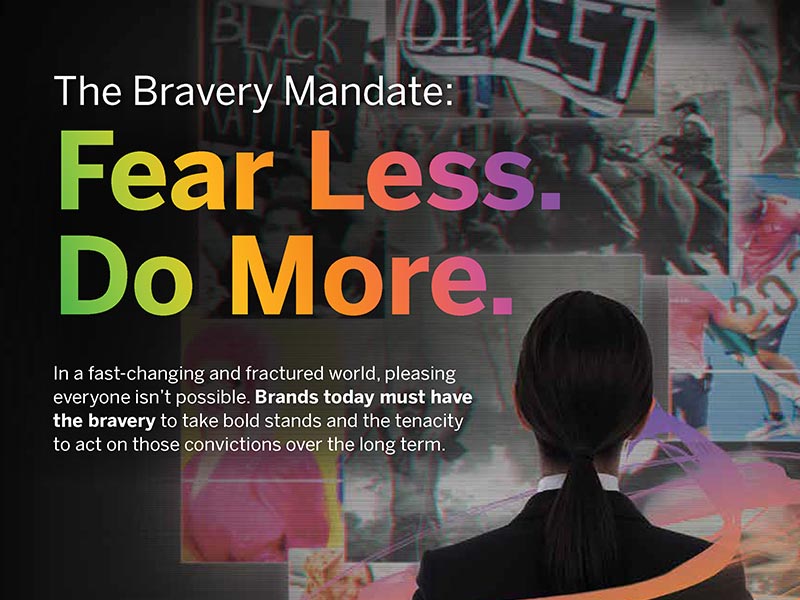Diana Marszalek 22 Sep 2021 // 1:00PM GMT

NEW YORK — Caught in the crosshairs of activists and cynics alike, brands must fortify their efforts to promote the greater good — even at the risk of alienating some stakeholders— to avoid being seen as purpose-washing, according to the latest global Brands in Motion report from WE Communications.
The Bravery Mandate report, released Wednesday, found the number of respondents expecting brands to bring stability to these rocky times has risen to 50%, which is 30% higher than it was in 2019. That number puts brands on par with other community pillars including educators (51%) and friends and family (49%). Only government (76%) ranked higher.
Those key findings were part of WE’s fifth annual look at the range of issues facing brands as they are increasingly called on to help make the world a better place amid crises, divisiveness, and fast-changing consumer expectations. WE conducted the study in partnership with YouGov, which polled 8,353 consumers and B2B decision makers in eight countries: the US, UK, Germany, South Africa, Australia, China, India and Singapore.
The research found that consumers are rewarding brand activism with their business, with two out of three of saying they would purchase from or recommend brands that support societal issues that matter to them.
The growing push for brand purpose, however, has also put companies in a tough spot, given the rise in skepticism about corporate activism.
According to the study, 52% of respondents said they believe brands take stands on societal issues as a means of boosting business. One-third don’t believe brands should weigh in at all.
In addition, consumers’ perception of brands’ impact on society has remained flat.
“In some ways, the movement to lead with purpose is a victim of its own success. With more players labeling their work as purposeful, the competition is much stronger, as some brands are doing extremely well and setting a high bar,” the report said.
“However, many other companies are hopping unthinkingly on the purpose bandwagon, and we are seeing a proliferation of ill-considered campaigns that leave much of the audience feeling jaded and cynical.”
In turn, it is far more beneficial for brands to partner with key stakeholders in shaping goals and values than dialing back on purpose to appease a larger swath of consumers.
That includes, according to the survey, companies being clear about what they stand for (90%); listening to stakeholders in deciding what issues to address (83%); invest in making the world a better place (75%); engage with social and global issues (71%); and focus equally on shareholder value and bringing their values to life (67%).
Respondents also expect to feel brands’ influence close-to-home. 41% of respondents said they expect brands to focus on local issues, versus just 5% who believe global issues should come first. 44% of respondents said brands should pay due attention to both.
Yet brands need to make sure their own houses are in order before getting involved in issues outside their organizations. Across most sectors, employee well-being is the No. 1 issue brands need to address to be considered leaders with strong purposes.
“Purpose is now mandatory, impacting immediate commercial outcomes as well as a brand’s long-term legacy,” said WE global CEO Melissa Waggener Zorkin. “Purpose determines not just which brands stay viable in the next few years but which will endure for years to come.”
Study takeaways also include recommendations that brands prioritize employee well-being and community engagement before engaging in other issues; consult with employees and consumers in selecting issues to address; and stay the course.
“In a world where everything is recorded, where the audience has multiple sources of information about how brands are behaving, the rules have changed. Organizations can no longer control the message; the only thing they can control is what they say and do,” the report said.
“That’s why it’s critical that brands find their internal bearings. This will enable them to both respond in real time when intense issues hit the headlines and maintain the stamina to go the distance.”



































.jpg)


















